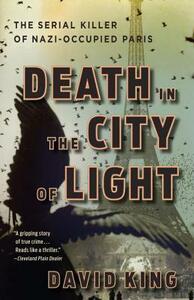Take a photo of a barcode or cover
David King definitely gives Erik Larson a run for his money in terms of engaging historical non-fiction, but I wonder if that has more to do with the subject he chose (the subtitle says it all). Regardless, I found the tale of Marcel Petiot super interesting/frightening, making the book an especially quick read.
I picked this book up from the librarian's recommendation table at my local branch for a few reasons, not the least of which was the 5 minute warning before closing time. I did not realize at the time that this was non-fiction. Once I started, I couldn't put it down. I don't typically go for true crime or for WWII-era stories; I often find these types of tales too disturbing to enjoy. But King's balance between fiction-style prose and informative structure highlight the intensity, absurdity, and tragedy of not only the Petiot case, but the Nazi infestation of one of the world's most incredible cities. I highly recommend this to true crime lovers, Christie aficionados, and history buffs alike.
This was a good read. Not quite "Devil in the White City" but, still good.
Can you say sicko? This book turned my stomach. Read the full review on my blog
I was completely startled by this story of a serial killer in Nazi Occupied France. How is it that I'd never heard this tale? A truly evil, sociopathic, opportunistic killer that preyed on those already preyed upon. While sometimes sickening, this novel is also fascinating in the details of secrets and alliances during the war as well as the workings of the French judicial system. Hard to put down!
True story about a serial killer operating in Paris during the German occupation (as if they didn't have enough problems then), going from the discovery of his lair through to the circus of a trial. Interesting glimpses into some of the problems involved in running a murder investigation during such times, and some interesting tidbits about the French legal system which I didn't know about. The author tries to give an impression not just of the case, but of Paris at the time. However, I found the many diversions into the social doings of Sartre, Camus, Picasso and friends distracting; though they might have been interesting for some, they didn't have much to do with the main topic and therefore felt unnecessary. Could have done with a little editing, but overall still an interesting story.
I was disappointed in the readability of this book. I was expecting a book about the hunt for a real-life serial killer in Nazi occupied Paris to be a riveting, page-turner. Instead, it was actually a rather dry account of the events and I had a difficult time slogging through all the difficult to pronounce French names with no pay-off in learning much of anything about the actual victims, other than the basics Mr. King no doubt gleaned solely from the court documents. This was characterized as "a colorful, character-rich narrative". I beg to differ. I will say that it gives a disturbing view of what life was like for Parisians during the 4 years spent under Nazi occupation.
So apparently in Nazi occupied Paris, a crazy doctor decided to kill a whole bunch of people and bury their bodies in his courtyard. Something went wrong and he got busted. Who knew? Probably not too many people until now. This book is great non fiction that reads like fiction and perfect for those who like true crime or if are interested in WWII.
dark
informative
slow-paced
I will commend this book for the good parts. Those are the narrative of the discovery of the charnel house and scenes of life in Nazi-occupied Paris. Outside of that, it’s just so information heavy and slow that it gets tedious and boring to me. Almost too many names to keep track of. I think it was just the presentation that didn’t vibe with me.
1. creepy-ass serial killer.
2. wartime Paris.
3. killer was discharged from WW1 with disability pension for PTSD.
4. really good research, problematic pacing.
5. nice, if brief, description of daily life in Occupied France, of how neither the French police nor the Gestapo could be trusted, of how the Gestapo used French organized crime rings.
2. wartime Paris.
3. killer was discharged from WW1 with disability pension for PTSD.
4. really good research, problematic pacing.
5. nice, if brief, description of daily life in Occupied France, of how neither the French police nor the Gestapo could be trusted, of how the Gestapo used French organized crime rings.





